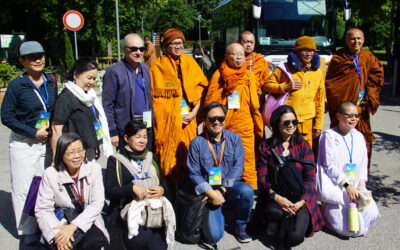
Members and friends of the Focolare representing various denominations were present alongside local clergy and ecumenical officers.
“The ecumenical legacy of the Vatican Council” was the cardinal’s theme, which he delivered not so much as a formal lecture, but as a personal account of his insights into ecumenism.
The cardinal began by recognising the contribution of the Focolare spirituality of unity and its ecumenical work, which pre-dated the Council. He spoke of Chiara Lubich as “one of the bright luminaries of our century, of the centuries” and considered her “numbered among the blessed in heaven.”
Cardinal Murphy-O’Connor recalled the Council decree on ecumenism, Unitatis Redintegratio, and its bold proclamation that “there is no ecumenism worthy of the name without a change of heart … without inner conversion, newness of attitude and unstinted love.”
He cited suspicion, inertia and impatience as the three enemies of ecumenism. Drawing on his own experience both in his time as a priest and later bishop of Arundel and Brighton, and in latter years as archbishop of Westminster, the cardinal summed up the ecumenical endeavour as something that begins locally from a relationship with those around us believing that “ecumenism is blessed where people are.”
Among the milestones since Vatican II, the cardinal highlighted Pope John Paul II’s visit to Canterbury Cathedral in 1982, which he described as “a beginning of new life, new hope.” The cardinal also cited the importance of Pope Francis’ recent meeting with Archbishop Justin Welby.
The Cardinal concluded his lecture by recalling Pope Francis’ recent address where he urged that bishops might be ‘shepherds for the flock … to tend hope and have sun and light in their hearts’. In recalling the Pope’s words, Cardinal Cormac communicated an optimism reminiscent of the Vatican Council. This was not simply a looking back with nostalgia at the good old days but a looking forward conscious that ‘the work of ecumenism is God’s work’ and our joint task is ‘to communicate God’s love to his people with that same sun and light in our lives’.
Following a question and answer session, Bishop Robin Smith, retired Anglican Bishop of Hertford, offered a vote of thanks reiterating the Cardinal’s affirmation of personal relationships in ecumenism and underlined that it is on these that the future of the Church, not least the unity of the Church, depends.
Source: Zenit






0 Comments